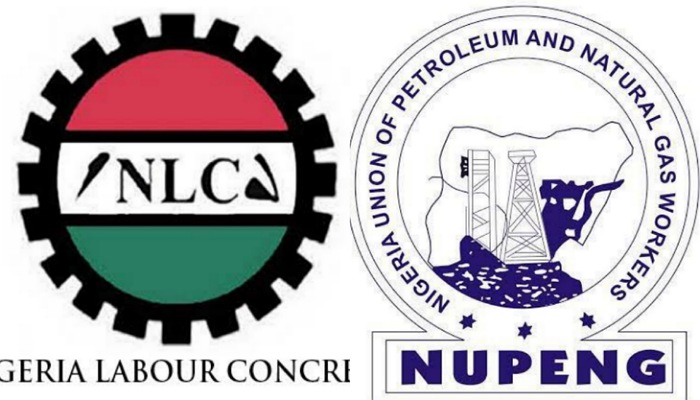The Economic Rights Activists (ERA) has condemned the Nigeria Labour Congress (NLC), the Nigeria Union of Petroleum and Natural Gas Workers (NUPENG), the Petroleum Products Retail Outlets Owners Association of Nigeria (PETROAN) and other affiliated unions for their planned nationwide strike.
According to ERA, the strike, if carried out, will disrupt fuel distribution and cripple Nigeria’s economic life.
ERA’s Executive Director, Dr. Josiah Inuwa, at a briefing in Abuja, described the proposed industrial action as a “reckless and unpatriotic” assault on the Nigerian people, warning that it would inflict severe hardship on millions while potentially serving the interests of economic saboteurs.
The unions’ grievances stemed from alleged anti-union practices at the Dangote Refinery and accusations of monopolistic control in the downstream petroleum sector.
Inuwa, however, argued that the strike would primarily harm ordinary citizens, small business owners, transport operators, and families, rather than corporate giants.
“The Okada rider in Enugu, the pepper seller in Osun, the teacher in Kaduna, and the mechanic in Port Harcourt will bear the brunt,” he stated.
“Transport fares will skyrocket, food prices will soar, hospitals will lose power, and small businesses will collapse. This is not a fight for justice—it is a direct attack on the Nigerian people.”
The ERA highlighted the devastating impact of past oil sector strikes, such as the 2012 fuel subsidy protests and the 2020 industrial actions, which cost the economy billions of naira daily and deepened recessionary pressures.
The group warned that the proposed strike could trigger similar losses, threatening Nigeria’s fragile economic recovery under President Bola Tinubu’s reforms.
Inuwa further raised concerns about the timing of the strike, noting its alignment with efforts by vested interests to undermine Nigeria’s push for energy self-sufficiency through the Dangote Refinery, a critical step toward ending decades of reliance on imported fuel.
“Whether knowingly or not, NLC, NUPENG, and PETROAN risk becoming pawns of cartels that profit from the status quo,” he said, accusing these groups of orchestrating sabotage to derail the refinery’s success.
The ERA also accused union leaders of hypocrisy, pointing to the disconnect between their public rhetoric and private privileges.
“Many of these leaders drive in convoys while the masses trek,” Dr. Inuwa remarked. “They negotiate secret deals behind closed doors while claiming to fight for justice in public squares.”
He criticised the unions for bypassing civilised dispute resolution mechanisms like arbitration and dialogue, instead resorting to “blackmail” that holds the nation’s fuel supply hostage. “Why choose to strangle a fragile economy at its jugular?” he questioned. “This approach is reckless and unacceptable.”
ERA called on the NLC, NUPENG, PETROAN, and other unions to immediately suspend the strike and return to the negotiation table to resolve grievances through dialogue.
It urged President Tinubu, the Ministry of Labour, and relevant agencies to stand firm against union pressure while facilitating constructive engagement.
The group also called on Dangote Refinery to transparently address workers’ concerns regarding unionisation and labour conditions, balancing its role as a strategic national asset with fair labour practices.
Additionally, the ERA urged the National Industrial Court and the Department of State Services (DSS) to establish mechanisms to deter what it called irresponsible strike threats that weaponise critical sectors like oil and gas.
They appealed to the National Assembly to summon all parties involved to ensure transparency and investigate potential sabotage by cartels profiting from Nigeria’s fuel import dependency.
Addressing Nigerians directly, Inuwa called for vigilance against manipulation by “empty rhetoric,” emphasising that the strike threat is not a noble struggle but a calculated move for control and monopoly.
“This is not about workers’ rights—it is about sabotage,” he warned. Praising Tinubu’s economic reforms as deliberate steps toward recovery, he cautioned that such progress was too fragile to withstand another disruption.





